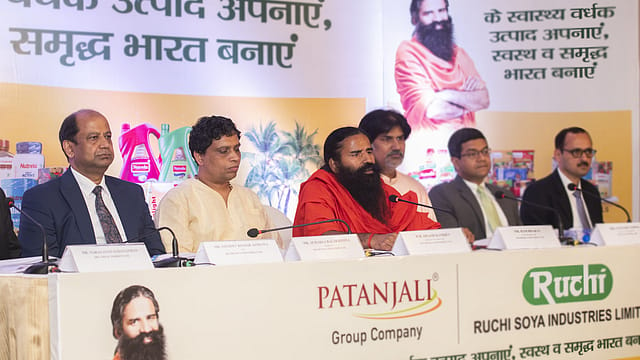Ruchi Soya shares jump 15% after FPO listing
ADVERTISEMENT

Share of edible oil maker Ruchi Soya Industries soared nearly 15% on Friday after listing of its follow-on public offer (FPO).
The Patanjali Ayurved-owned company's stock jumped 14.71% to ₹938 apiece on the National Stock Exchange.
The company, where Baba Ramdev is one of the directors, raised ₹4,300 crore from the FPO. A follow-on offer is when a firm issues additional shares after an initial public offering.
Patanjali Ayurved aims to make its companies debt-free in the coming three-four years, with a substantial portion (62%) of Ruchi Soya's proceeds from the ₹4,300 crore follow-on public offer to be used to partly retire the company's debt of ₹3,330 crore.
Patanjali completed the acquisition of Ruchi Soya in a ₹4,350-crore deal in December 2019. Since then, it has managed to grow the business to ₹16,318 crore in FY21.
The jump in Ruchi Soya's stock price comes as the Reserve Bank of India (RBI) cautioned that edible oil price pressures are likely to remain elevated in the near-term due to export restrictions by key producers as well as loss of supply from the Black Sea region.
A spike in edible oil prices is likely in the near-term as the Russia-Ukraine war has hit shipments of sunflower oil – which comprises 15% of most edible oil brands. Ukraine and Russia together account for 90% of India's sunflower oil imports.
In an interview with Fortune India in March, Sanjeev Asthana, CEO of Ruchi Soya, said that if the war continues till April, the sunflower sowing season could get impacted, and that could lead to scarcity for a longer period. "So, the pressure would be on to soya oil, which has two dimensions. Both in Brazil and Argentina, from where we import soybean, the crop looks sluggish. To add to that is the mandate on biodiesel and how much of soya oil needs to be used there. There is rapid work happening in Argentina and Brazil which has led to supply shortage," Asthana said.
There is a 10-15 million tonne shortage of the soybean crop, he said, adding that sunflower oil and soybean oil prices have gone up by $300-$500 per metric tonne. "Demand going towards soya and soya itself falling a little short is having a spiralling impact on commodity prices. However, this situation will not last for long. It's a war premium that we are paying and the moment the war ends the prices will be back to earlier levels," said Asthana.
"Sunflower is a concern therefore customers may move to soya consumption…it depends on the impact on the sunflower oil pricing. But this won't be for the full year, so I am imagining anywhere between 400,000 tonnes to 600,000 tonnes of sunflower oil consumption will go to soybean. We will have to reassess the situation in three-four months," he added. "All companies carry stock of 35-40 days. The war may have some impact in terms of prices and volumes, but that's not going to be dramatic."